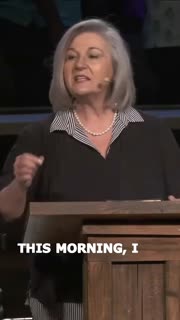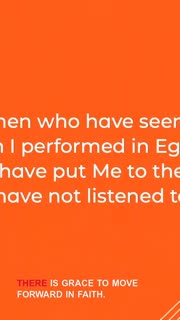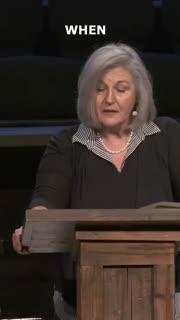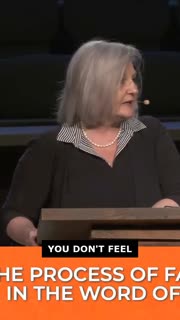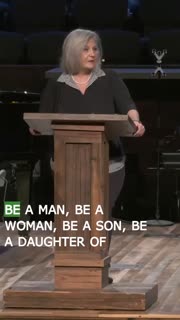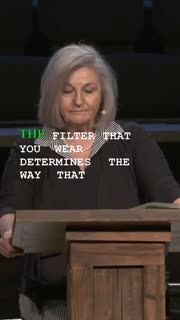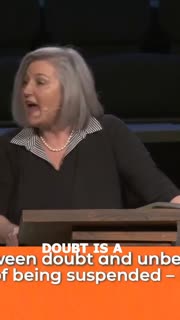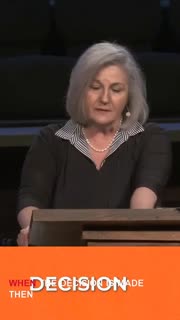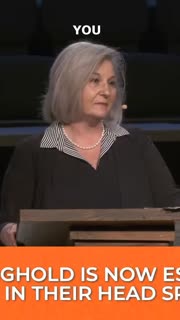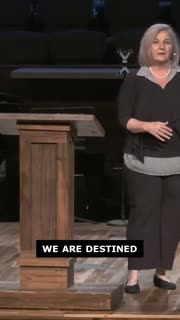Choosing Faith: Overcoming Fear and Embracing Hope
Summary
### Summary
Today, we explored the profound theme of hope and faith, particularly in the context of life's challenges. We began by acknowledging that many of us feel on the brink of losing hope due to various personal struggles. However, we were reminded that true hope is found in Jesus Christ alone. We then delved into the story from Numbers 13 and 14, where the Israelites faced a pivotal moment of decision after spying out the Promised Land. The majority of the spies returned with a negative report, filled with fear and doubt, while only Joshua and Caleb brought back a report of faith and confidence in God's promises.
The narrative highlighted the importance of the filters through which we view our lives. We can either see our circumstances through the lens of faith or through the lens of unbelief. The ten spies allowed their fear to distort their perception, leading to rebellion and a refusal to trust in God's word. In contrast, Joshua and Caleb chose to trust and obey God, despite the apparent obstacles. This choice to view life through the filter of faith rather than fear is crucial for us as believers.
We also discussed the dangers of doubt and unbelief. Doubt can leave us suspended in indecision, while unbelief is a firm rejection of God's word, leading to rebellion. The story of the Israelites serves as a cautionary tale about the consequences of allowing fear to dominate our decisions. Conversely, the faith of Joshua and Caleb exemplifies the power of trusting in God's promises, even when circumstances seem insurmountable.
In our own lives, we must be vigilant about the filters we use to interpret our experiences. We need to reject the filters of insecurity, materialism, and tradition that can lead us away from God's truth. Instead, we should embrace the filter of faith, which enables us to see God's hand at work and trust in His plans for us. By doing so, we can move forward with confidence, knowing that God is with us and will fulfill His promises.
### Key Takeaways
1. Hope in Jesus Alone: True hope is found only in Jesus Christ. When we place our hope in anything else—be it people, circumstances, or material things—we set ourselves up for disappointment. Jesus is the unchanging anchor for our souls, and placing our hope in Him brings lasting peace and assurance. [02:18]
2. The Danger of Faulty Filters: The way we perceive our circumstances is influenced by the filters we use, such as past experiences, education, and upbringing. Faulty filters can lead us to misinterpret situations and make poor decisions. We must consciously choose to view life through the filter of faith in God's word rather than through the lens of fear and unbelief. [16:34]
3. Doubt vs. Unbelief: Doubt is a state of suspension and indecision, while unbelief is a firm rejection of God's word. While doubt is a natural part of the human experience, it becomes dangerous when it leads to prolonged indecision. Unbelief, on the other hand, is outright rebellion against God. We must address our doubts quickly and choose to believe God's promises. [19:49]
4. The Power of Faith: Faith is not a feeling but a choice to trust in God's promises. Joshua and Caleb exemplified this by choosing to believe in God's ability to give them the Promised Land, despite the intimidating circumstances. Faith begins by silencing the voices of doubt and unbelief and focusing on what God can do rather than on our limitations. [49:23]
5. Rejecting Fear and Embracing Courage: Fear leads to devastation, division, and rebellion, while faith leads to hope, unity, and courage. The Israelites' fear caused them to cry all night and grumble against their leaders, ultimately leading to rebellion. In contrast, Joshua and Caleb's faith encouraged the people to trust in God and move forward. We must choose to reject fear and embrace the courage that comes from faith in God's promises. [46:00]
### YouTube Chapters
[0:00] - Welcome
[02:18] - Placing Hope in Jesus
[04:03] - The Story of the Spies
[05:30] - The Bad Report
[06:58] - Caleb's Faith
[08:25] - The Consequences of Rebellion
[10:07] - The Saddest Words in Scripture
[11:56] - Filters of Perception
[13:27] - Personal Story: Guntersville Lake
[16:34] - Faulty Filters and Rebellion
[18:17] - Deliverance from Rejection
[19:49] - Doubt vs. Unbelief
[21:26] - The Paradigm of Fear
[23:03] - Divine "Buts" in Scripture
[24:43] - The Negative Report
[26:48] - Insecurity and Materialism
[28:27] - Tradition vs. God's Word
[30:10] - The Danger of Doubt
[31:57] - Deception and Fear
[33:29] - Story: The Princess and the Goblins
[35:17] - Assumptions and Decisions
[37:06] - Strongholds in the Mind
[38:44] - David and Goliath
[40:39] - Shadrach, Meshach, and Abednego
[42:25] - Transforming Our Headspace
[44:25] - The Herd Mentality
[46:00] - Disapproval of Leadership
[47:42] - The Minority Report
[49:23] - The Process of Faith
[51:17] - A Call to Faith and Courage
[53:07] - God's Purpose in Shaking
Study Guide
### Bible Reading
- Numbers 13:1-3, 25-30
- Numbers 14:1-10, 20-24
### Observation Questions
1. What was the initial report of the ten spies about the Promised Land, and how did it differ from the report given by Joshua and Caleb? ([05:30])
2. How did the Israelites react to the negative report from the ten spies? ([06:58])
3. What was God's response to the Israelites' rebellion and lack of faith? ([08:25])
4. How did Joshua and Caleb demonstrate their faith in God's promises despite the opposition? ([06:58])
### Interpretation Questions
1. What does the story of the spies in Numbers 13 and 14 teach us about the consequences of viewing life through the lens of fear and unbelief? ([16:34])
2. How does the distinction between doubt and unbelief, as explained in the sermon, impact our understanding of faith? ([19:49])
3. In what ways can faulty filters, such as insecurity, materialism, and tradition, distort our perception of God's promises? ([28:27])
4. How can the example of Joshua and Caleb inspire us to trust in God's promises even when circumstances seem insurmountable? ([49:23])
### Application Questions
1. Reflect on a recent situation where you felt on the brink of losing hope. How can you shift your focus to place your hope fully in Jesus? ([02:18])
2. Identify a "faulty filter" in your life, such as insecurity or materialism. How has this filter affected your decisions and perception of God's promises? ([16:34])
3. Think about a time when you experienced doubt. How did you address it, and what steps can you take to ensure it doesn't lead to prolonged indecision or unbelief? ([19:49])
4. Joshua and Caleb chose to trust in God's promises despite the apparent obstacles. What is one specific area in your life where you need to exercise this kind of faith? ([06:58])
5. Fear can lead to devastation and rebellion, while faith leads to hope and courage. How can you actively reject fear and embrace courage in your daily life? ([46:00])
6. The sermon mentioned the importance of viewing life through the filter of faith. What practical steps can you take to ensure you are interpreting your experiences through this filter? ([16:34])
7. How can you encourage others in your small group or community to trust in God's promises and reject the filters of fear and unbelief? ([49:23])
Devotional
Day 1: Anchoring Hope in Jesus
True hope is found only in Jesus Christ. When we place our hope in anything else—be it people, circumstances, or material things—we set ourselves up for disappointment. Jesus is the unchanging anchor for our souls, and placing our hope in Him brings lasting peace and assurance. In a world filled with uncertainties and challenges, it is crucial to remember that Jesus is our steadfast source of hope. He never changes, and His promises are always true. By focusing on Him, we can find the strength and peace needed to navigate life's difficulties. [02:18]
Hebrews 6:19-20 (ESV): "We have this as a sure and steadfast anchor of the soul, a hope that enters into the inner place behind the curtain, where Jesus has gone as a forerunner on our behalf, having become a high priest forever after the order of Melchizedek."
Reflection: What are some areas in your life where you have placed your hope in things other than Jesus? How can you begin to shift your focus and place your hope in Him today?
Day 2: Choosing the Right Filters
The way we perceive our circumstances is influenced by the filters we use, such as past experiences, education, and upbringing. Faulty filters can lead us to misinterpret situations and make poor decisions. We must consciously choose to view life through the filter of faith in God's word rather than through the lens of fear and unbelief. The story of the spies in Numbers 13 and 14 illustrates how different filters can lead to vastly different outcomes. While the majority saw obstacles, Joshua and Caleb saw opportunities through the lens of faith. [16:34]
2 Corinthians 5:7 (ESV): "For we walk by faith, not by sight."
Reflection: Think about a recent situation where you felt overwhelmed or fearful. How might viewing it through the filter of faith change your perspective and response?
Day 3: Addressing Doubt and Unbelief
Doubt is a state of suspension and indecision, while unbelief is a firm rejection of God's word. While doubt is a natural part of the human experience, it becomes dangerous when it leads to prolonged indecision. Unbelief, on the other hand, is outright rebellion against God. We must address our doubts quickly and choose to believe God's promises. The Israelites' journey to the Promised Land serves as a cautionary tale about the consequences of allowing doubt and unbelief to dominate our decisions. [19:49]
James 1:6-8 (ESV): "But let him ask in faith, with no doubting, for the one who doubts is like a wave of the sea that is driven and tossed by the wind. For that person must not suppose that he will receive anything from the Lord; he is a double-minded man, unstable in all his ways."
Reflection: Identify a specific promise of God that you struggle to believe. What steps can you take to address your doubts and strengthen your faith in this area?
Day 4: Embracing the Power of Faith
Faith is not a feeling but a choice to trust in God's promises. Joshua and Caleb exemplified this by choosing to believe in God's ability to give them the Promised Land, despite the intimidating circumstances. Faith begins by silencing the voices of doubt and unbelief and focusing on what God can do rather than on our limitations. By choosing faith, we align ourselves with God's power and purposes, enabling us to overcome obstacles and fulfill His plans for our lives. [49:23]
Hebrews 11:1 (ESV): "Now faith is the assurance of things hoped for, the conviction of things not seen."
Reflection: What is one area of your life where you need to exercise more faith? How can you actively choose to trust God's promises in this situation?
Day 5: Rejecting Fear and Embracing Courage
Fear leads to devastation, division, and rebellion, while faith leads to hope, unity, and courage. The Israelites' fear caused them to cry all night and grumble against their leaders, ultimately leading to rebellion. In contrast, Joshua and Caleb's faith encouraged the people to trust in God and move forward. We must choose to reject fear and embrace the courage that comes from faith in God's promises. By doing so, we can experience the fullness of God's plans and purposes for our lives. [46:00]
Isaiah 41:10 (ESV): "Fear not, for I am with you; be not dismayed, for I am your God; I will strengthen you, I will help you, I will uphold you with my righteous right hand."
Reflection: What is one fear that is holding you back from fully trusting God? How can you take a step of courage today to overcome this fear and embrace God's promises?
Quotes
### Quotes for Outreach
1. "This morning, I believe that that song was orchestrated to be sung in this house just for you because there is always hope in Jesus. As a matter of fact, if your hope is not in Jesus, it's a misplaced hope." [02:18] (17 seconds)
2. "There is grace to move forward in faith. There is never grace to go backwards because to go backwards requires fear and God does not work through fear. God works through faith." [08:25] (17 seconds)
3. "When you look at the 10 spies that brought back the bad report, I would like to lighten it up and call it negative, but Scripture calls it a bad or an evil report, and I will do what Scripture does, and I'll call it what it is." [19:49] (15 seconds)
4. "Faith is not a feeling. You don't feel faith. Faith is a choice that you make. Sometimes that choice can be accompanied by an inner sense of knowing or an inner witness of the Holy Spirit that you are going in the right direction, but faith is not a feeling. Faith is a choice that we make." [47:42] (16 seconds)
5. "Be a man, be a woman, be a son, be a daughter of God that's willing to stand up and say, with man, it's not possible, but with God, all things are possible." [51:17] (13 seconds)
### Quotes for Members
1. "The filter that you wear determines the way that you perceive or interpret every event around you. As a matter of fact, before I started growing up in the Lord, I accepted Christ when I was 19. I was a mess when I came into the kingdom of God." [18:17] (18 seconds)
2. "Doubt is a normal part of our human experience with this caveat. Don't stay there too long, because doubt is a very dangerous place. Doubt is the state of being suspended. There's no decision being made. It's a place of indecisiveness." [19:49] (20 seconds)
3. "When the decision is made then strongholds are established in your headspace. Second Corinthians chapter 10 verses 3 and 4 simply say this, for though we walk in the flesh we do not war according to the flesh for the weapons of our warfare are not carnal they are mighty through God to the pulling down of strongholds." [37:06] (22 seconds)
4. "You cannot defeat what you're in agreement with and David refused to be in agreement with an uncircumcised Philistine. There is a world out there that does not know Jesus. Sinners sin and I am not mad because sinners sin." [40:39] (23 seconds)
5. "We are destined and we are called to be a people of his praise, a people for his honor and for his glory. If you would, would you stand with me, please? These altars are open. These altars are always open." [53:07] (20 seconds)
